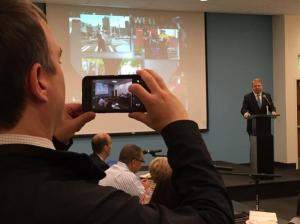You have a serious car accident. The police arrive and investigate. They issue a citation and write a report. The officers are wearing body-worn video cameras and their cars have dashcam video. At the end of the event the officer gives you a code. The next day you go online to the police department’s website, key in the code and all the materials regarding the collision are available to you – the videos, with a written transcript, the officers’ reports, the citation, the sketches and photographs of the accident scene, witness statements, and perhaps a history of other collisions and problems at that intersection.
That’s one vision laid out at a body-cam video workshop hosted by the Seattle Police Department on Tuesday, June 23. The event included officers from the Orlando, Louisville and Dallas police departments, plus representatives of the Police Foundation, Code for America and Socrata, the Seattle company which powers open data portals such as data.gov and data.seattle.gov. These organizations are all participating in the White House sponsored Police Open Data initiative, announced last month by the Obama Administration.
“Policing is in a crisis,” said Seattle Police Chief Operating Officer (COO) Mike Wagers several times during the workshop. “Police are not necessarily using more force or making more mistakes,” he added, but there’s been a change in the technology available to the general public. “Two-thirds of adults in the United States will own a camera-capable smartphone by the end of this year.” Those smartphones mean there is more video than ever being taken of police-citizen encounters and uploaded to YouTube and similar sites.
What’s the real future for police video? Can the privacy of victims, children and witnesses be protected while at the same time making this video public? Is it possible to “redact” or blur the faces and audio of such people to protect them yet release the video to the public?
The rest of this article is on GeekWire here.
See also the previous article discussing how Seattle Police held a hackathon in December, 2014, to find ways to redact video.
Implementing a body-worn video camera program requires much more than just buying the cameras themselves – there is storage and indexing and search and making the video public and much more – here is a previous blog post discussing these issues.




As a former police administrator I am very much in favor body cameras for police. NIJ studies indicate that complaints of excessive force are drastically reduced. In approximately 85% of cases where complaints are pursued, police are exonerated. I commend Seattle on an imaginative and effective use of technology. As a former Public Safety applications architect and developer, I believe the technology considerations are very solvable. The professional and thorough approach being taken will result in success, and perhaps a model for agencies everywhere.